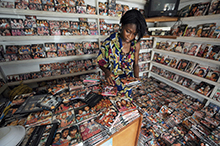Runaway Success
Finance & Development, June 2016, Vol. 53, No. 2

Nigeria’s film industry is taking off
She was named one of the 100 most influential people by TIME magazine in 2013, alongside Michelle Obama and Beyoncé. She has more than 1 million likes on her Facebook page. She is a United Nations World Food Programme ambassador and an Amnesty International activist. She is certainly one of the most popular actors most people outside Africa have never heard of.
Meet Omotola Jalade Ekeinde, the queen of Nollywood, the Nigerian film industry. With more than 300 films, and millions of video copies sold, she is living proof of Nigeria’s film industry dynamism. After decades of slow growth, Nollywood, one of the largest film industries in the world in terms of number of films produced, is a story of runaway success.
The industry currently accounts for N 853.9 billion ($7.2 billion), or 1.42 percent of Nigeria’s GDP. It employs more than a million people directly or indirectly. It is being touted as the country’s second-biggest source of jobs after agriculture. Based on the sheer quantity and quality of films being made, economic observers consider Nollywood one of the major planks on which to diversify the Nigerian economy. According to Roberts Orya, former CEO of the Nigerian Export-Import Bank, a development bank owned by the federal government, Nollywood generates at least $590 million annually. That is still a small number, given the scale of Nigeria’s economy and its population, but the industry is making a difference.
According to Charles Awurum, actor and producer, the impact of Nollywood on Nigeria is there for all to see. “If for nothing else, Nollywood has created thousands of jobs for so many Nigerians. The industry is open to all who are talented in all areas of the motion picture industry. It has drastically prevented and reduced the crime rate in the country, put food on people’s table—and the multiplier effect is tremendous. It is an industry that if given the enabling environment will be the country’s number one revenue earner. It has improved the lifestyles of Nigerians,” he said.
African success story
Nollywood films have a large following in Africa and among the African diaspora. These films gained popularity during the digital revolution of the early 1990s, when camcorders replaced 35 mm cameras and digital systems replaced celluloid as recording devices. Nigeria continued to use the inexpensive VHS tapes and players, which were easily accessible and affordable for consumers, but eventually film technology evolved as movies on DVD started to generate huge demand.
Producing a movie in Nigeria costs between $25,000 and $70,000 on average. Films are produced within a month and are profitable within two to three weeks of release. On average movies released as DVDs are reported to sell more easily, to the tune of 20,000-plus units, and top-rated successful ones sell more than 200,000 units.
Patrick Ebewo, a Nigerian writer, attributes the popularity of Nigerian movies not only to their low unit cost but also to their “indigenous content of issues relevant to a mass audience.” Through a combination of African story lines and Western technology, “these films document and recreate socio-political and cultural events,” he said. The former director-general of the United Nations Educational, Scientific and Cultural Organization, Kōichirō Matsuura, says that “film and video production are shining examples of how cultural industries, as vehicles of identity, values, and meanings, can open the door to dialogue and understanding between peoples, but also to economic growth and development.”
Actress Ebube Nwagbo notes that Nollywood has put Nigeria in a positive light by placing it on the world map. “There are lots of reasons for the industry’s success in Africa, but most importantly, it is the acceptance and recognition. They have accepted Nollywood. It’s definitely an industry to reckon with. We have been able to tell our stories in our own African way, and Africans can identify and relate to it,” she said.
Lillian-Amah Aluko, actress, producer, and scriptwriter, attributes Nollywood’s success in Africa to its portrayal of Africans telling African stories in their own way and often in their own languages. “The thirst and hunger for local productions has made way for the rise of pay-per-view TV on the continent, which in turn has helped put some funding in the way of producers, either by purchasing their content or commissioning productions. Also the rise of Internet use on the continent has helped bridge a little of the distribution problems, as content is also now available online,” she notes.
A long history
Though filmmaking was on the rise in the 1960s, Nigeria’s domestic video industry, Nollywood, made a dramatic leap in 1992 with the release of the thriller Living in Bondage. The film, written by Kenneth Nnebue and Okechukwu Ogunjiofor, tells the story of a businessman who killed his wife in a human sacrifice ritual that made him rich overnight but who is then haunted by her ghost. It instantly became the first Nigerian blockbuster. Since then, thousands of releases have been similarly successful.
The release of Living in Bondage sparked the revival of the domestic video industry, which had started decades before. In fact the Nnebue experiment followed years of hard work by pioneering filmmakers such as Hubert Ogunde, Jab Adu, Ola Balogun, Moses Olaiya (Baba Sala), and Eddie Ugboma. The industry considers these professionals the first generation of Nigerian filmmakers.
Nigeria became fully involved in the production of films in the 1970s, when the first indigenous feature film, Kongi’s Harvest, written by Nobel Prize laureate Wole Soyinka, was produced in the country. But an American directed the film, and many of its crewmembers were foreigners. Later, more people, such as Balogun, Ugbomah, and Ladi Ladebo, to mention a few, got involved in producing indigenous films. Because Nigeria has such a long history of film making, many people criticize the term Nollywood for its lack of originality, merely aping the labels of the two largest film industries—Hollywood in the United States and Bollywood in India.
The importance of Nollywood to the Nigerian economy was only fully realized when the Nigerian GDP was rebased in 2014. The sectors captured in the rebasing exercise were arts, entertainment, and recreation; financial institutions and insurance; real estate, professional, scientific, and technical services; administrative and support services; public administration, education, human health, and social services; and other services—these had previously not been included in GDP at all. Among the segments included for the first time were Nollywood, the information technology sector, the music industry, online sales, and telecommunications. As a result of this rebasing exercise, Nigeria’s GDP in 2013 jumped from an initial estimate of $285.5 billion to $510 billion.
Opportunities for growth
Clearly, the Nollywood film industry is not just about entertainment; it is also a moneymaker. The spread of digital technology has been identified as a growth driver for the film industry and will continue to play that role as domestic and foreign consumption continue to rise. Greater Internet access, increased smartphone use, and improved bandwidth are also contributing to a production boom.
An increase in demand for programming is likely to generate new opportunities for content producers too. According to a PricewaterhouseCoopers report, Nigeria’s entertainment and media revenue could more than double, to an estimated $8.5 billion in 2018, from $4 billion in 2013, with the Internet a key driver. The number of mobile Internet subscribers is forecast to surge to 50.4 million in 2018, from 7.7 million in 2013, according to the report. In addition, the region’s growing young population and the development of the Internet represent huge potential for the industry.
Likewise, pay-TV penetration is forecast to reach 24.4 percent in 2018, with competition among digital terrestrial television operators set to grow after Nigeria migrates to digital. But there is some doubt whether the country will be able to meet the June 2016 digital switchover deadline—set by a 2006 agreement brokered by the United Nations’ International Telecommunication Union.
Platforms such as Nigeria’s iROKOtv offer new distribution channels for the more than 2,000 Nollywood films produced annually. The tech company, which pays filmmakers about $10,000 to $25,000 for the right to stream their content for a period of time, claims to be the world’s largest online distributor of African content, with a catalogue of 5,000 Nollywood films.
As Nollywood matures, consumers’ expectations are likely to change, and current practices and pricing and delivery methods may need review. With the emergence of alternative movie distribution technologies, such as those offered by services such as Apple Store and Netflix, consumers will demand more.
The need for homegrown content remains crucial to the development of the industry. For Charles Igwe, filmmaker and CEO of the production firm Nollywood Global, content is quickly going digital, with an explosion of film content in all forms. “Big telecoms companies will have to improve delivery … creating the capacity to make content is imperative if we are going to exist in this space.”
Dealing with the pirates

However, Nollywood’s popularity also means serious piracy problems. Based on data from the World Bank, news website TRUEAfrica.co estimates that for every legitimate copy sold, nine others are pirated. This means little or no income going to the filmmakers and practically no revenue for the government.
Nollywood movies are increasingly consumed outside Nigeria. The retailers of these movies are few and far between in most cities. And despite the success of the movies, Nollywood actors’ incomes are low. Even the most popular are paid only between $1,000 and $3,000 a film. Only a few can claim higher earnings. It appears likely that illegal downloads and bootleg DVDs will continue to undercut revenue.
The country is taking steps to strengthen intellectual property rights, including a $9.85 million state fund to improve Nigeria’s content distribution network. The current collaboration between the World Bank and the Nigerian Export Promotion Council, the Nigerian Copyright Commission, and the National Film and Video Censors Board is therefore necessary and urgent, many analysts believe.
Over time, Nollywood will have to abandon the current pricing and supply models that have served it so well and gravitate toward more globally acceptable standards. The industry is already stepping up its standards to match those of other countries’ film industries. A new group of professional actors—among them, Genevieve Nnaji, Ramsey Nouah, Kunle Afolayan, and Desmond Elliot—is coming on stage.
Nollywood and its Queen Omotola, who recently topped the charts at $32,000 a film, are bracing for new opportunities and new records. ■
Opinions expressed in articles and other materials are those of the authors; they do not necessarily reflect IMF policy.


